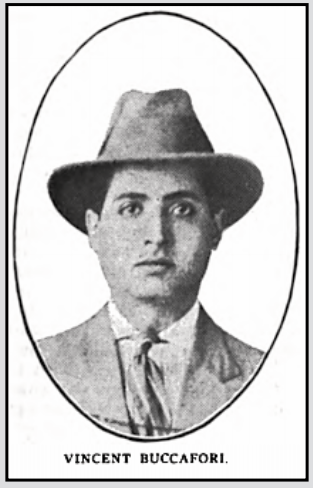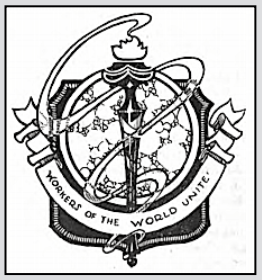 —————
—————
Hellraisers Journal – Wednesday May 17, 1911
“The General Strike” -from Speech by Big Bill Haywood
From the International Socialist Review of May 1911:
[Part I of II]
Comrades and Fellow-Workers:
I came tonight to speak to you on the general strike. And this night, of all the nights in the year, is a fitting time. Forty years ago today there began the greatest general strike known in modern history, the French Commune; a strike that required the political powers of two nations to subdue, namely, France and the iron hand of a Bismarck government of Germany. That the workers would have won that strike had it not been for the copartnership of the two nations, there is to my mind no question. They would have overcome the divisions of opinions among themselves. They would have re-established the great national workshops that existed in Paris and throughout France in 1848. The world would have been on the highway toward an industrial democracy, had it not been for the murderous compact between Bismarck and the government of Versailles.
We are met tonight to consider the general strike as a weapon of the working class. I must admit to you that I am not well posted on the theories advanced by Jaures, Vandervelde, Kautsky and others who write and speak about the general strike. But I am not here to theorize, not here to talk in the abstract but to get down to the concrete subject of whether or not the general strike is an effective weapon for the working class. There are vote-getters and politicians who waste their time coming into a community where 90 per cent of the men have no vote, where the women are disfranchised 100 per cent and where the boys and girls under age of course are not enfranchised. Still they will speak to these people about the power of the ballot, and they never mention a thing about the power of the general strike.
They seem to lack the foresight, the penetration to interpret political power. They seem to lack the understanding that the broadest interpretation of political power comes through the industrial organization; that the industrial organization is capable not only of the general strike, but prevents the capitalists from disfranchising the worker; it gives the vote to women, it re-enfranchises the black man and places the ballot in the hands of every boy and girl employed in a shop, makes them eligible to take part in the general strike, makes them eligible to legislate for themselves where they are most interested in changing conditions, namely, in the place where they work.
I am sorry sometimes that I am not a better theorist, but as all theory comes from practice you will have observed, before I proceed very long, that I know something about the general strike in operation.
Going back not so far as the Commune of Paris, which occurred in 1871, we find the great strike in Spain in 1874, when the workers of that country won in spite of combined opposition against them and took control of the civil affairs. We find the great strike in Bilboa, in Brussels. And coming down through the halls of time, the greatest strike is the general strike in Russia, when the workers of that country compelled the government to establish a constitution, to give them a form of government—which, by the way, has since been taken from them, and would cause one to look on the political program of Russia at least as a bauble not worth fighting for. They gave up the general strike for a political constitution. The general strike could and did win for them many concessions they could gain in no other way.
While across the water I visited Sweden, the scene of a great general strike, and I discovered that there they won many concessions, political as well as economic; and I happened to be in France, the home of all revolutions, during the strike on the railroads [October 1910]—on the state as well as the privately owned roads. There had been standing in the parliament of France many laws looking toward the improvement of the men employed on the railroads. They became dissatisfied and disgruntled with the continued dilatory practices of the politicians and they declared a general strike. The demands of the workers were for an increase of wages from three to five francs a day, for a reduction of hours and for the retroaction of the pension law. They were on strike three days. It was a general strike as far as the railroads were concerned. It tied up transportation and communication from Paris to all the sea port towns.
The strike had not been on three days when the government granted every demand of the workers. Previous to this, however, Briand had issued his infamous order making the railroaders soldiers-reservists. The men went back as conscripts; and many scabs, as we call them over here (I don’t know what the French call them; in England they call them “blacklegs”) were put on the roads to take the places of 3,500 discharged men.
The strike apparently was broken, officially declared off by the workers. It’s true their demands had all been granted, but remember there were 3,500 of their fellow-workers discharged. The strikers immediately started a campaign to have the victimized workers reinstated. And their campaign was a part of the general strike. It was what they called the greve perlee, or the “drop strike”-if you can conceive of a strike while everybody is at work; everybody belonging to the union receiving full time, and many of them getting overtime, and the strike in full force and very effective.
This is the way it worked-and I tell it to you in the hopes that you will spread the good news to your fellow-workers and apply it yourselves whenever occasion demands-namely, by making the capitalist suffer. Now there is only one way to do that; that is, to strike him in the place where he carries his heart and soul, his center of feeling-the pocket book. And that is what those strikers did. They began at once to make the railroads lose money, to make the government lose money, to make transportation a farce so far as France was concerned.
Before I left that country on my first visit-and it was during that time that the strike was on-there were 50,000 tons of freight piled up at Havre, and a proportionately large amount at every other seaport town. This freight the railroaders could not move. They did not move; and when they did, it was in this way: They would load a trainload of freight for Paris and by some mistake it would be billed through to Lyons, and when the freight was found at Lyons, instead of being sent to the consignee at Paris it was carried straight through the town on to Bayonne or Marseilles or some other place-any place but where it properly belonged. Perishable freight was taken out by the trainload and sidetracked.
The conditions became such that-the merchants themselves were compelled to send their agents down into the depots to look up their consignments of freight-and with very little assurance of finding it at all. That this was the systematic work of the railroaders there is no question, because a package addressed to Merle, one of the editors of La Guerre Sociale, now occupying a cell in the Prison of the Saint, was marked with an inscription on the corner, “Sabotagers please note address.” This package went through posthaste. It worked so well that some of the merchants began using the name of La Guerre Sociale to have their packages immediately delivered. It was necessary for the managers of the paper to threaten to sue them unless they refrained from using the name of the paper for railroad purposes.
Nearly all the workers have been reinstated at the present time on the railroads of France.
That is certainly one splendid example of what the general strike can accomplish for the working class.
Another is the strike of the railroaders in Italy. The railroaders there are organized in one great industrial union, one card taking into membership the stenographers. train dispatchers, freight handlers, train crews and the section crews. Everyone who works on the rail road is a member of the organization; not like it is in this country, split up into as many divisions as they can possibly get them into.
There they are all one. There was a great general strike. It resulted in the country taking over the railroads. But the government made the mistake of placing politicians in control, giving politicians the management of the railroads. This operated but little better than under private capitalism. The service was inefficient. They could make no money. The rolling stock was rapidly going to wreck. Then the railroad organizations issued this ultimatum to the government, and it now stands: “Turn the railroads over to us. We will operate them and give you the most efficient service to be found on railroads in any country.” Would that be a success for the general strike? I rather think so.
[Photograph and emphasis added.]
~~~~~~~~~~~~~~~~~~~~~~
SOURCE
The International Socialist Review, Volume 11
(Chicago, Illinois)
July 1910-June 1911
https://books.google.com/books?id=8-05AQAAMAAJ
ISR-May 1911
-page 680: General Strike by BBH
https://www.marxists.org/history/usa/pubs/isr/v11n11-may-1911-ISR-gog-Corn-OCR.pdf
IMAGE
BBH, ISR p68, Aug 1910
https://play.google.com/books/reader?id=8-05AQAAMAAJ&printsec=frontcover&pg=GBS.PA68
See also:

From ISR of May 1911:
-page 685: “Shall This Man Serve Ten Years in Sing Sing”
-by Elizabeth Gurley Flynn re Vincent Buccafori
https://www.marxists.org/history/usa/pubs/isr/v11n11-may-1911-ISR-gog-Corn-OCR.pdf
General Strike (Speech)
https://archive.iww.org/history/library/Haywood/GeneralStrike/
The General Strike (Pamphlet)
-by William D. Haywood
IWW Publishing of Chicago, 1915-1917?
https://babel.hathitrust.org/cgi/pt?id=mdp.39015079009182;view=2up;seq=1
Paris Commune
https://en.wikipedia.org/wiki/Paris_Commune
Jean Jaurès
https://en.wikipedia.org/wiki/Jean_Jaur%C3%A8s
Emile Vandervelde
https://en.wikipedia.org/wiki/Emile_Vandervelde
Karl Kautsky
https://en.wikipedia.org/wiki/Karl_Kautsky
1909: Swedish General Strike
https://libcom.org/history/1909-swedish-general-strike
“THE FRENCH RAILWAY STRIKE.”
New York Times of Oct 13, 1910, page 10
https://www.nytimes.com/1910/10/13/archives/the-french-railway-strike.html
La Guerre Sociale (1906-1916)
https://fr.wikipedia.org/wiki/La_Guerre_sociale_(1906)
~~~~~~~~~~~~~~~~~~~~~~~~~~~~~~~~~~~~~
Workers of the World Awaken
Lyrics by Joe Hill
If the workers take a notion,
They can stop all speeding trains;
Every ship upon the ocean
They can tie with mighty chains.
Every wheel in the creation,
Every mine and every mill,
Fleets and armies of the nation,
Will at their command stand still.


